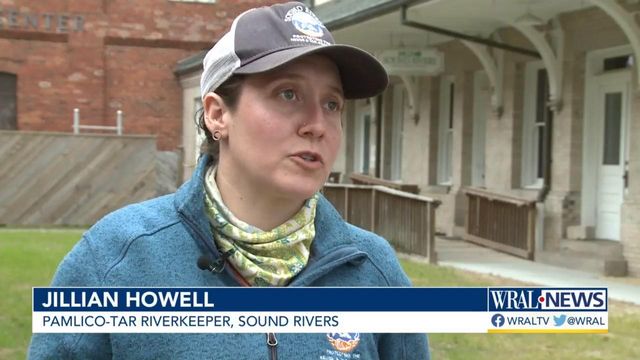Rising sea level could impact North Carolina's coastline
North Carolina's coastline could start to shrink, putting some of our state's history in jeopardy of disappearing.
Posted — UpdatedOne historical coastal community that could see direct impacts from climate change is Washington, North Carolina. From stories of triumph where the enslaved once dashed along the Freedom Trails to the historic homes that line the waterfront, Beaufort County is rich in history.
People who live along the riverside say it is unsettling to think about rising sea level on top of the flooding risk they already face with tropical weather.
Richard Smoot, owner and innkeeper of 1820 Elmwood, a bed and breakfast in Washington, said the house had prominent roles on both sides of the Civil War.
In the 1800s, Samuel Latham Grist, the owner’s son, was a member of the Confederate regiment the Washington Grays.
"When the regiment departed, the sendoff ceremony was held at Elmwood due to its local prominence rather than at the county courthouse, which would have been more typical," Smoot said.
Smoot added, “During the Civil War, Washington was occupied by Union forces in 1862, and Elmwood was used as the Union headquarters, Camp Ceres, from 1863 to 1864. Like many large southern homes during the Civil War, Elmwood was also used as a wartime hospital.”
Elmwood was moved to its current site near the Tar and Pamlico rivers in 1910.
Smoot said the house is 10 feet above sea level, which may be the reason the 200-year-old home is still standing. He hopes his flood insurance will help preserve the history at his bed and breakfast.
"[Flood insurance] is a must-have if you want to live in a place that is beautiful 99% of the time, you have to cover that 1% of the time that might be a little risky," Smoot said.
Jillian Howell from Sound Rivers, a nonprofit protecting the Neuse and Tar-Pamlico rivers in eastern North Carolina, said humans can't wait to consider what rising sea level could do.
"These are more frequent, wetter storms that happen all year round, dropping a lot of rain," Howell said. The storms have been fueled by climate change and are causing localized flooding in and around the basins."
Howell said we must start thinking about climate change now because people live along the river.
“There are a bunch of communities along the river in the process of going through resiliency planning efforts, thinking about what the next 50 years look like or how the people adapt,” said Howell.
Howell said infrastructure programs won't stop climate change, but they could help with mitigation. Sound Rivers is exploring ways to mitigate flooding by building constructive wetlands, installing cisterns and using bio soil so there is more capacity to hold water when there is more of it.
“We have a program where we are installing green storm water infrastructure around community college campuses,” she added.
Smoot added he will also be looking for other ways to make sure Elmwood stays around for years to come.
As the climate continues to warm, environmental experts say that the threat to homes in Rodanthe is only going to increase.
"Sea level rise is likely to continue to make these problems worse and make it even more challenging to manage these coastal areas," said David Hallac, superintendent of the eastern North Carolina branch of the National Parks Service.
Hallac said even visitors are at-risk as the ocean sucks up homes along the shore. When these homes do collapse, wood structures and nails end up in the ocean and will eventually wash up on the shore.
"Public safety is probably our number one concern right now," he said. "The second concern of course is just the beauty of the seashore. Folks come to the seashore to see pristine, un-impacted beaches. And we hope to be able to provide that."
Related Topics
• Credits
Copyright 2024 by Capitol Broadcasting Company. All rights reserved. This material may not be published, broadcast, rewritten or redistributed.






